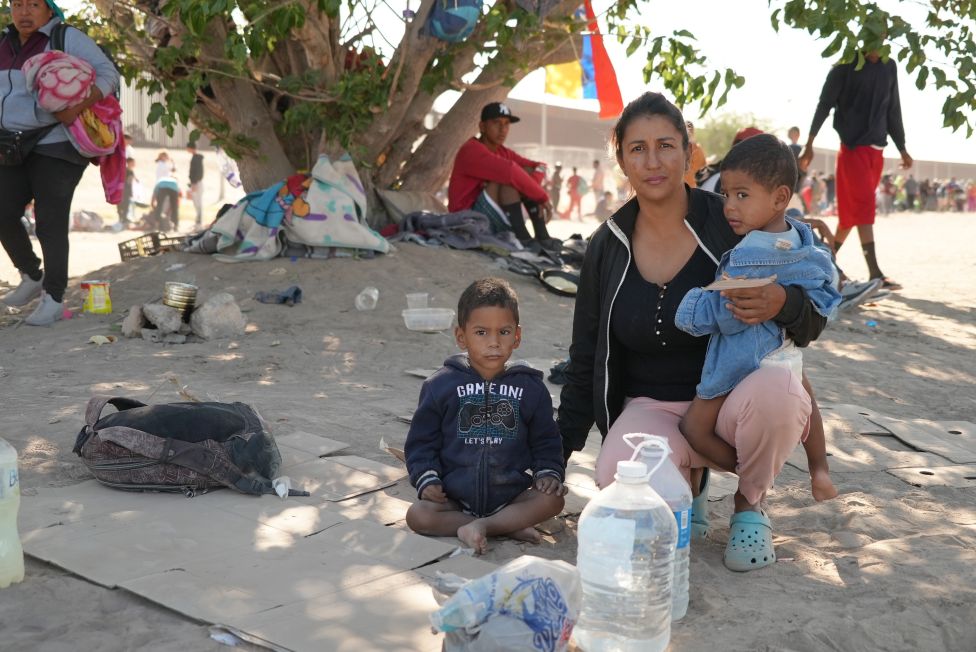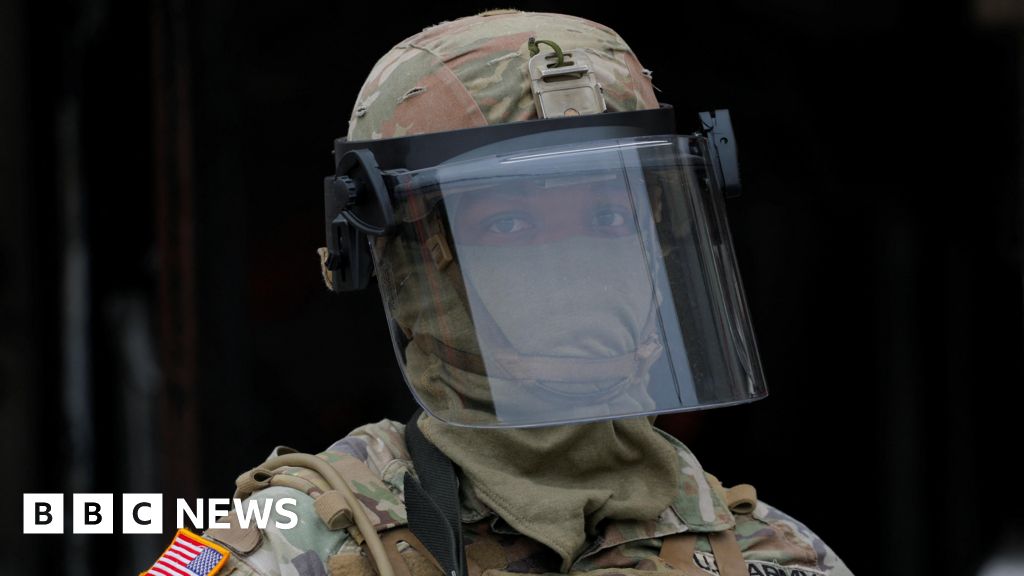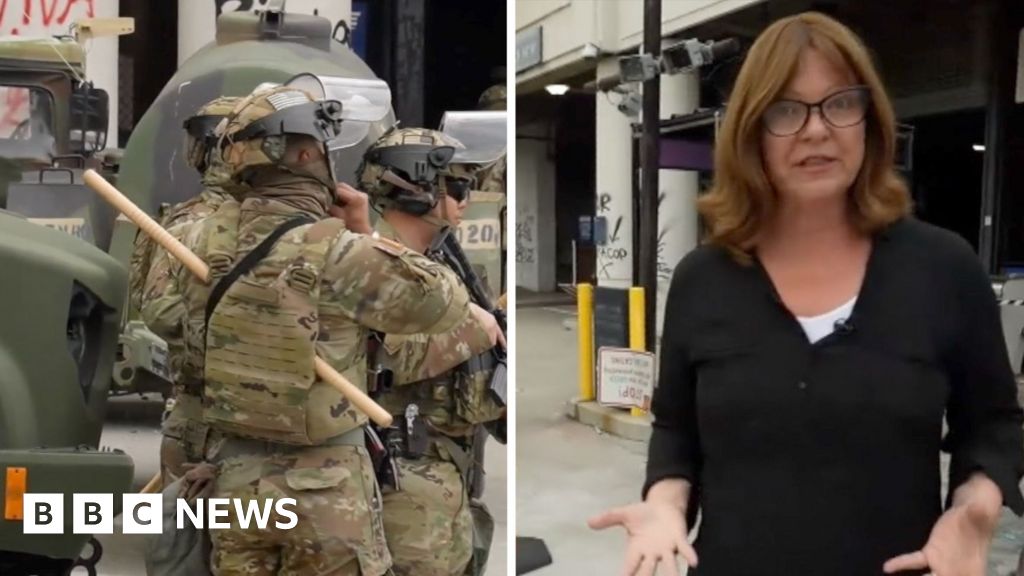ARTICLE AD BOX

MiLexi Gomez made a perilous journey from Venezuela with her children
By Sarah Smith, North America editor
Reporting from Ciudad Juarez
As the hours count down to a dramatic shift in US immigration policy and an expected surge of migrants at the southern border, those already waiting to enter from Mexico are increasingly desperate.
Beneath an unrelenting sun, hundreds of people are standing in a dry and dusty wasteland. Waiting.
Hungry and thirsty, exhausted and frightened, they have all gathered right beside the huge steel border fence that separates them from the United States. They can see through it, to the place they have sacrificed so much to try to reach.
But no one knows if they will be allowed across that border.
Rosario Medina says that to find food for her grandchildren she has been sifting through dumpsters. Even gathering water for the babies bottles from the polluted Rio Grande river.
No wonder tears roll down her face as she describes trying to survive here for the last eight days, as the children's lips blister in the sun.
To meet these people, I first had to step across that stinking river and then crawl in the dirt through a small gap in the razor wire fence. I then heard the stories of the frightening journeys many of these people had endured.
MiLexi Gomez told me about travelling from Venezuela. Taking her four young children through unmarked jungle, carrying them up mountains and then having to jump on top of trains when they could not afford to buy tickets. Now they are all having to sleep in the dirt, she fears the colds her twin boys are suffering could turn to bronchitis.
"We are feeling desperate" she says. "We can't sleep at night because it's too cold. We don't have money to eat, we have no way to wash. I ask God what I should do to protect my children in this place".
Watch: The migrants stuck between two border walls
These scenes are highly unusual. Normally migrants seeking to enter America would be housed in shelters in downtown Juarez. But the sheer numbers who have gathered in recent days have overwhelmed the system. Officials who have worked along the border for decades say they have never seen anything like it.
Most of the people I spoke to had an idea that the rules governing entry to the US are changing this week. But there was widespread misinformation and confusion about what that will mean for migrants like them.
Many believe that as soon as Title 42 - the Covid-era policy that made it easier to send migrants and asylum seekers back across the border - is lifted entry into the US will be much easier. That is one reason why such huge numbers of people have gathered at the border.
Others rushed to get here as they think that they must attempt entry before midnight on Thursday.
MiLexi says she had heard on the news that she had to arrive before the 11 May to stand a chance of getting in. She is worried that with so many other people also gathered here her family might not make it across the border in time.
"We are very worried because we have already sacrificed so much," she told me. "If we can't get into America, I don't know where we will go as we can't go back to my country. That's the truth."
Image source, Getty Images
Image caption,Biden sent more troops to the border to help
Officials at the border have said the influx could top 10,000 a day when the law changes in a few hours. President Joe Biden said this week that "it's going to be chaotic for a while" but Republicans lay the blame for it at his door.
"Joe Biden sent a message that America's border is open, and millions of people answered that call and started coming across our border illegally," said House Majority Leader Steve Scalise,
The Biden administration says they are making it safer and easier for people like MiLexi and her family to follow a lawful path to asylum. An estimated 30,000 refugees from Venezuela as well as Nicaragua, Cuba and Haiti will be accepted each month. But after that quota has been met others will be returned to Mexico.
Rosario Medina knew nothing of these legal changes when her family set off for the US last October. As they are from Guatemala they might soon find it harder to gain asylum. She told me about how she fears for the safety of her young daughter and grandchildren in a country dominated by gangs who frequently murder, rape and kidnap.
Rosario Medina and family
Under new immigration rules she would only be accepted if she can demonstrate her family faces an "imminent and extreme threat". And she would have to have made an appointment at one of about 100 (not yet built) regional processing centres throughout South America to apply for asylum before travelling to the US.
When I met Dicar Matano he had a green sweater wrapped around his head to try to ward off the sun. He is convinced that anyone who can make it into America before the 12 May cannot legally be deported. That is why he has been sleeping here in this dusty no man's land for over a week, along with his wife, son and seriously ill brother.
Having run out of money he is now begging for food. "I am ashamed as I don't like to beg or ask for free help. I like to earn my living with my own hard work," he told me. He left Venezuela because he says he couldn't pay to feed his family there.
In future, migrants like the Matano family will not be able to simply arrive at the US border and request asylum. All migrants will be deemed ineligible for asylum if they cannot prove they previously requested protection in a third country on their way to the US. The Matano family would have to have first asked for asylum in Mexico before they could request entry to the US.
Dicar Matano
The US says it will launch advertising campaigns through Central and South America to communicate the new rules and to try to stop people turning up at the border.
For those who are already here, there is confusion and fear about whether they will ever make it across.
Occasionally the gate in the imposing metal fence opens and a handful of people are allowed through. It's not at all clear how the lucky few are selected.
Yet each time the gate moves you feel the collective surge of hope from these people who are convinced all their hardships will have been worth it if they can get the chance to start again in America.

 2 years ago
46
2 years ago
46








 English (US) ·
English (US) ·